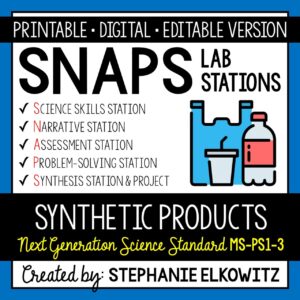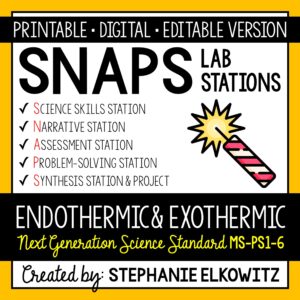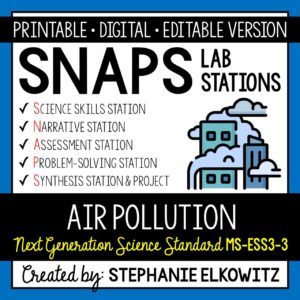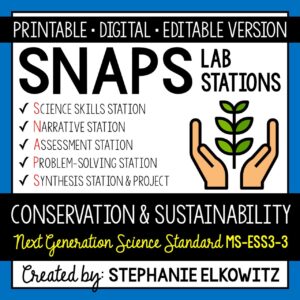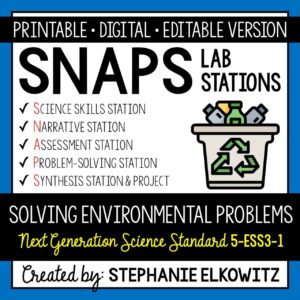Density Lab
$7.00
An engaging lab activity designed to enhance students’ understanding of density and the factors that influence the density of a substance.
Description
SNAPs Lab Stations Activities require students to use science, math, literacy, problem-solving and engineering skills. They are designed to enhance students’ understanding of scientific concepts and help students apply scientific ideas to the real world. Each station activity promotes skills so to develop students into proficient and competent scientific thinkers.
SNAPs lab activities have five components:
• Science Skills Station to develop science skill proficiency
• Narrative Station to build science literacy
• Assessment Station to evaluate learning and understanding
• Problem-Solving Station to foster engineering design
• Synthesis Station and Project to inspire higher-order learning
DIGITAL LABORATORY – DISTANCE LEARNING & DIGITAL CLASSROOMS
• This lab is offered in a digital format to support digital classrooms & distance learning.
• The digital lab activity is designed to work with Google Slides and Microsoft PowerPoint
• The digital lab activity CANNOT be edited. However:
– Students can manipulate text boxes
– Students can create tables, graphs and diagrams
– Students can insert images and drawings
GOOGLE FORM ASSESSMENT STATION
• The assessment station is offered as a self-grading Google Form.
• Questions are all short answer and are 100% editable.
• Suggestions for use are included in the download.
DISTANCE LEARNING COMPATIBILITY
SNAPs lab activities are rated for their ease with distance – independent learning. Refer to the preview for more information about how well this laboratory works in a fully digital classroom and with distance learning.
EDITABLE DOCUMENTS
This download includes an editable word document (docx file) of all lab components:
• Pre-Lab and Post-Lab Activities
• The Lab Overview
• Lab Station Activities and Questions
• Directed Synthesis Project (when applicable)
Important Notes:
• Diagrams, illustrations, tables and graphs essential to lab activities are included
• Illustrative clipart is NOT included
• Editable documents and rubrics are included with the FREE SNAPs Setup Guide
Editable files allow you to:
• Edit the scope of the activities so to suit your students’ needs
• Edit the materials required based on resource availability
• Create single-period “mini-labs” using activities at the individual skills stations
The activities at each station in this lab are detailed below.
Density Lab Stations Activity Learning Objectives
1. Calculate the density of a regular and irregular shaped object.
2. Predict if an object will float or sink in a substance with a known density.
3. Describe the factors that influence the density of a substance.
4. Compare and contrast the density of ice and liquid water.
5. Model the density of liquids with a seven-layer density column.
Science Skills Station
Students will calculate the density of regular and irregularly shaped objects. They will determine the volume and mass of the objects and use the measurements to calculate density. Then students will determine whether the objects will float or sink in three different substances: rubbing alcohol, water and corn syrup.
Narrative Station
Students will read an informational text about density. Students will also watch a video about the density of water and why solid water (ice) floats in liquid water.
Assessment Station
At this station, students will answer questions about key terms and ideas relating to density. Students must employ lower, mid and higher order thinking skills to answer these questions.
Problem-Solving Station
Students will be provided with seven substances and their densities. Students will manipulate the substances in such a way to create a seven-layer column of liquids. The layers will remain separate and distinct.
Synthesis Station
Students will compose a CER (claim-evidence-reasoning) report to summarize the lab. Students are provided the claim statement and must support the claim with observations, data and other information gathered in the lab. Students will explain how the evidence supports the claim using scientific reasoning.
Synthesis Project
Students will have a choice of 11 projects. Refer to the SNAPs Lab Stations Best Practices and Setup Guide for directions and suggestions on how to conduct the project.
This download includes:
• A pre-lab assignment and post-lab reflection
• Directions and questions for each lab station
• Student recording sheets
• Teacher Key
Additional Materials Required:
Water
Salt
3 Grape or Cherry Kool-Aid mixes (19 oz)
1 large beaker (500 mL or greater)
9 500 mL beakers (or similar container)
100 mL graduated cylinder
Coffee filter paper (or weighing boats)
2 Scales
Spoon or other scooping tool
Stirring rod
Colored pencils
NEXT GENERATION SCIENCE STANDARDS
This laboratory does not address a specific Next Generation Science Standard, but it complements NGSS concepts. It combines the three dimensions of science learning – science and engineering practices, disciplinary core ideas and crosscutting concepts – in order to meet the standard. This laboratory also makes interdisciplinary connections to STEM, Math CCSS and ELA CCSS to build the appropriate skills.
TERMS OF USE
• All rights reserved by Stephanie Elkowitz.
• This product is to be used by the original purchaser only.
• Intended for classroom and personal use only.
• Copying for more than one teacher, classroom, department, school, or school system is prohibited.
• This product may not be distributed or displayed digitally for public view.
• Failure to comply is a copyright infringement and a violation of the Digital Millennium Copyright Act (DMCA).




